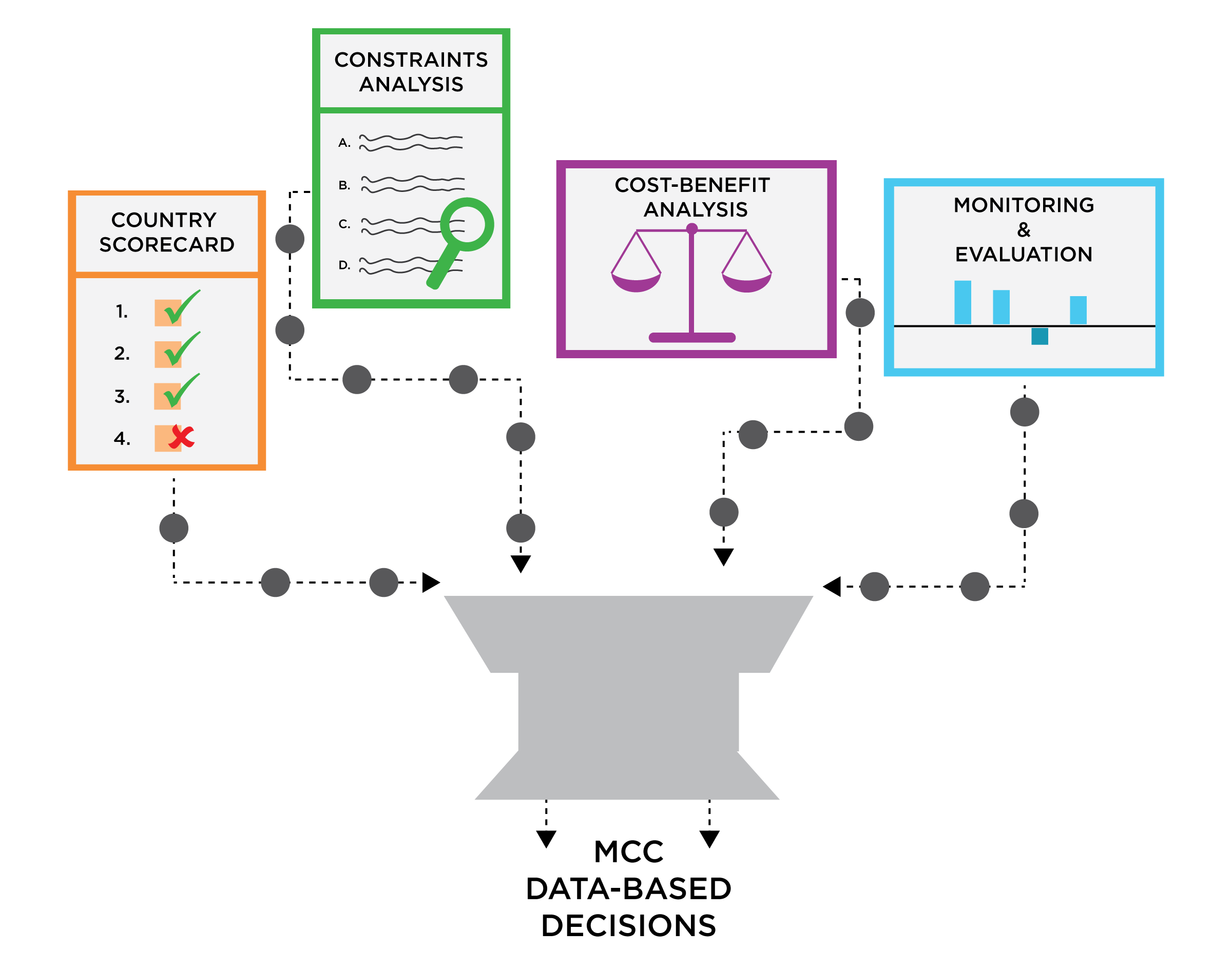Results
MCC is committed to achieving and measuring results, holding itself accountable for those results, transparently reporting its results data and evaluations, and learning from the evidence to improve future programs. MCC targets and achieves results in the following three ways:
- MCC catalyzes results by incentivizing good policies and reforms. MCC’s stringent eligibility criteria and global credibility have created a powerful incentive for reform, often before spending a dollar on country programs.
- MCC drives results through its compact and threshold investments which are tracked meticulously and evaluated independently. It has shown that a country-driven model of development can achieve measurable results.
- MCC promotes systemic change in policies, institutions, and sectors that outlives MCC engagement. It models best practices that are adopted and absorbed by partner countries. MCC’s unique model increases partner-country capacity and promotes sustainability, accountable fiscal stewardship, and transparent procurement processes that outlast the lifetime of its compacts.
MCC’s commitment to making decisions based on data and evidence pervades all stages of its engagement. MCC:
- Chooses partners based on 20 publicly available indicators that measure democracy, good governance and sound economic and social policies.
- Focuses compacts based on the binding constraints to economic growth in the countries.
- Chooses projects based on careful due diligence, including cost-benefit analysis and beneficiary analysis to ensure cost-effectiveness, to identify projects with, in most cases, a projected economic rate of return (ERR) greater than 10 percent, and to ensure that MCC’s projects achieve growth and reduce poverty. The average estimated ERR over the life of the investment is 16 percent.
- Monitors and tracks progress through the life of the compact, making adjustments to programs as needed.
- Emphasizes outcome measurement to be able to assess how and if projects boost living standards for beneficiaries.
- Draws lessons from rigorous evaluations conducted by independent experts.

Because of this rigorous tracking, MCC has evidence of where projects are meeting or exceeding outcome targets—incomes, employment, productivity, and reduced costs--and where they are not; and MCC is committed to sharing these results publicly. This evidence informs and shapes future project design and decisions. In response to early results, MCC has:
- Improved its tools with a more consistent approach to constraints analyses, beneficiary and gender analyses, and use of common indicators. Used time between when a compact is signed and when it enters into force (when the five-year clock starts) more effectively to work with country partners to set up implementation and procurement systems and hire staff.
- Developed standards to ensure that programs are designed to show measurable results, and established an evaluation review and management process that involves MCC and country stakeholders, and fosters accountability and learning at all stages of the project cycle.
- Shared learning through Principles into Practice papers on results and evaluations, and summarized findings in a public evaluation catalog.
Lessons Learned
MCC practices what it preaches on transparency and accountability. Through self-assessment, MCC has moved to translate setbacks into adaptation and better approaches. A few examples:
- Data-driven resource allocation. A strong data-driven analytical and measurement framework is essential for choosing the right sectors and projects. Project selection in early compacts was suboptimal and inefficient without this framework, as valuable time was spent assessing long country wish lists lacking an underpinning in economic analysis.
- Country-led design and implementation. Building country implementation capacity needs to be an early focus, and adequately resourced, in the compact process. Early compacts invested too little in country capacity, in some cases with weak results. Implementation capacity needs to include both technical competence and the ability to mobilize decision-making at the political level. This capacity is viewed and assessed as part of the governance outcome of the compact.
- Managing costs. Insufficient early-stage investment in project preparation and risk mitigation was a principal reason for weak project delivery and cost overruns. Later compacts explicitly corrected this problem.
- Leveraging the private sector. In the early years, MCC did not deploy its grants strategically and catalytically enough to mobilize private investment. A more systematic focus on private investment has confirmed that high leverage is achievable.
- Creating systemic impact. A sharp and deep focus on one or two sectors enables greater systemic and sustainable impact. Early compacts spread MCC resources thinly across too many activities, limiting their scale, impact, and sustainability.

